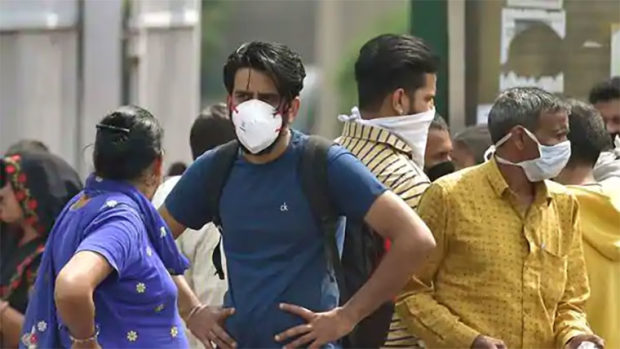
COVID-19: Properly fitted multilayer masks can reduce particle transmission by 96 pc, says study
PTI, Apr 3, 2021, 12:27 PM IST

Washington: Properly fitted multilayer masks block 84 per cent of particles expelled by a person wearing it, while two people donning these types of masks can reduce transmission by close to 96 per cent, according to a new study.
While wearing a face mask can protect people from COVID-19, scientists, including those from Georgia Institute of Technology in the US, said the type of material, tightness of fit, and the number of fabric layers used can significantly affect exposure risk to the novel coronavirus.
The study, published in the journal Aerosol Science and Technology, measured the filtration efficiency of ultrasmall submicron particles passing through a variety of different materials.
“A submicron particle can stay in the air for hours and days, depending on the ventilation, so if you have a room that is not ventilated or poorly ventilated then these small particles can stay there for a very long period of time,” said Nga Lee (Sally) Ng, a co-author of the study from the Georgia Institute of Technology.
In the research, the scientists tested 33 different commercially accessible materials, including single-layer woven fabrics such as cotton and woven polyester, blended fabrics, cellulose-based materials, and those commonly used in hospitals.
“We learned there was a lot of variability in filtration performance even in the same type of material,” Ng said.
According to the scientists, commercially available materials that provide acceptable levels of submicron particle rejection while still maintaining air flow resistance similar to a surgical mask.
“These materials combine fabric fibre density, a maze-like structure, and fibre surface chemistry to effectively reject submicron particles,” said Ryan Lively, another co-author of the study.
For homemade masks, the scientists found that the best-performing materials were the commercially available blackout drapery and sterilisation wrap widely used for packing surgical instruments.
The researchers suggested that filters such as a HEPA/MERV or vacuum bags should be avoided unless they are certified to be fibreglass-free since these often release glass fibres on their own that can be inhaled.
Loose-knitted material, batting fabric, felt, fleece, or shiny, reusable shopping bags are also to be avoided, they added.
While multilayered masks performed much better than single-layer samples, the scientists said people should also pay attention to breathability.
They emphasised that mask fit is also important since particles can easily escape through gaps at the nose or through the sides.
Based on the analysis, the scientists said properly fitted and multilayer masks reject 84 per cent of particles expelled by a wearer while the particle transmission reduced by 96 per cent when such masks were worn by two people.
“The best way to protect ourselves and others is to reduce exhaled particles at the source, and the source is our face,” Ng said.
“That really gets amplified when everyone starts wearing masks,” she added.
Udayavani is now on Telegram. Click here to join our channel and stay updated with the latest news.
Top News

Related Articles More

Study links social inequality to dementia-related changes in brain

People single all their lives might have low life satisfaction: Study

Drinking tea, coffee linked to lower risk of head and neck cancer: Study

Study shows how brain chemicals control eating, could help develop improved obesity drugs

‘Faster walkers’ had significantly lower risk of diabetes, hypertension: Study
MUST WATCH
Latest Additions

Ex-MP D K Suresh files plaint against woman over ‘misuse’ of his name

Karnataka govt to challenge bail granted to actor Darshan in Renukaswamy murder case

Rajnath Singh and General Dwivedi visit Mhow-based Army War College

Day after youth’s death, Sunburn organisers say prompt medical assistance was provided

203 individuals held for visa and passport fraud in 2024
Thanks for visiting Udayavani
You seem to have an Ad Blocker on.
To continue reading, please turn it off or whitelist Udayavani.


















